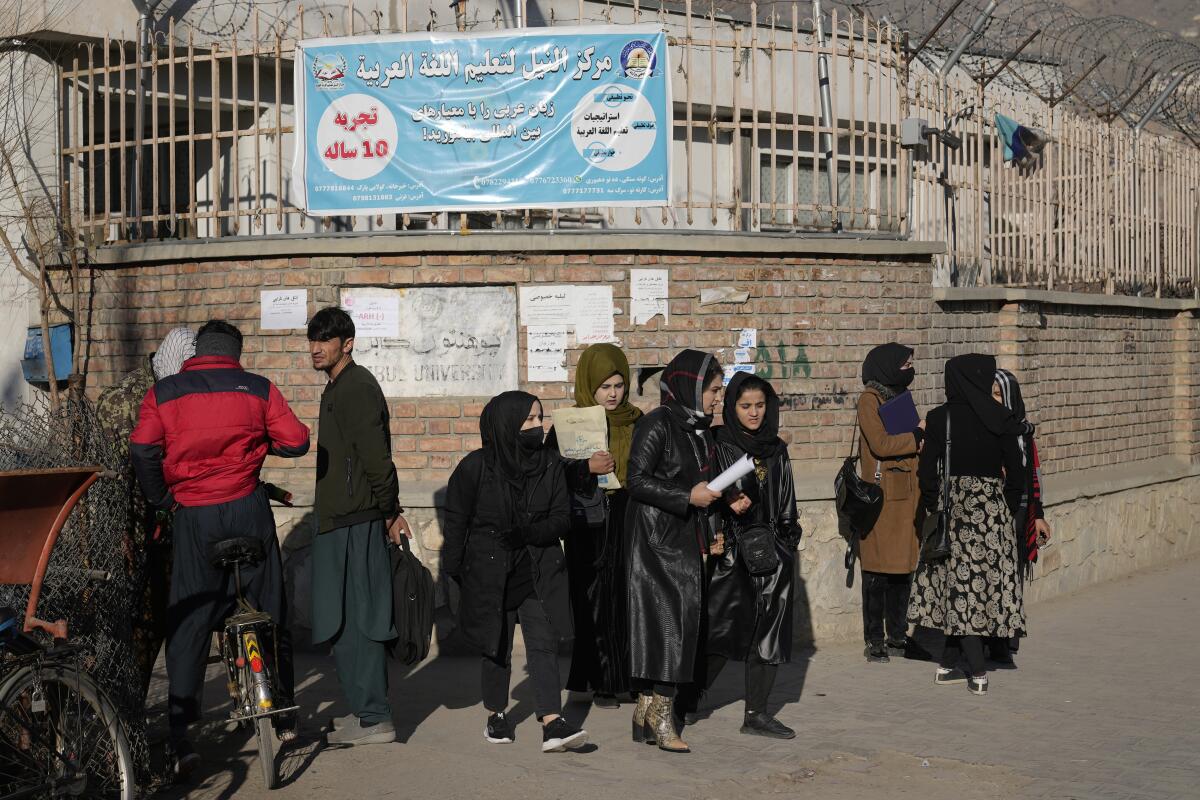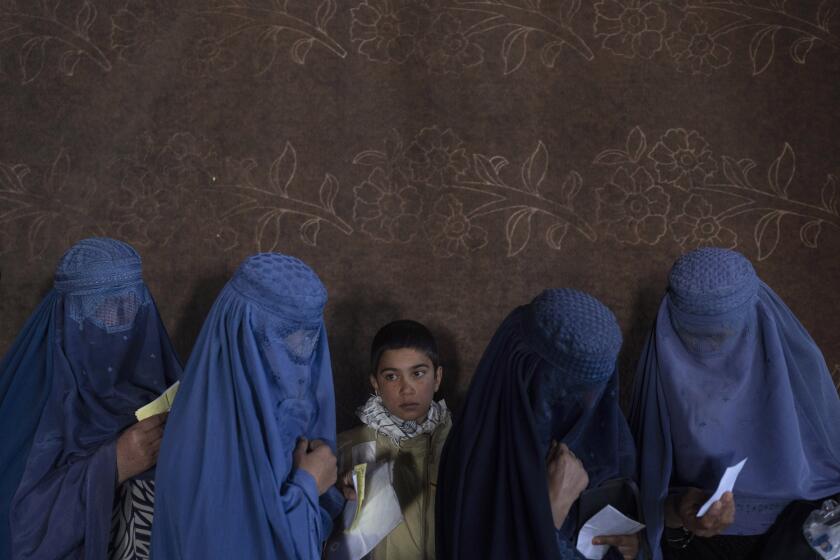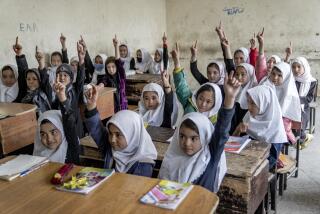Afghanistan students weep as Taliban bars women from universities, ditching former pledge

- Share via
KABUL — Taliban security forces on Wednesday enforced a ban on higher education for women by blocking their access to universities in the Afghan capital, where some female students wept and consoled one another outside one Kabul campus.
On Tuesday, Afghanistan’s Taliban rulers issued an edict forbidding women to attend private and public universities, effective immediately. The government has not given a reason for the ban or reacted to the fierce and swift global condemnation of it.
Journalists saw Taliban forces outside four Kabul universities Wednesday. The forces stopped some women from entering; in other cases, female students were allowed to go in and finish their work. The forces also tried to prevent any photography, filming and protests.
Video obtained by the Associated Press showed some women crying outside one university.
Rahimullah Nadeem, a spokesman for Kabul University, confirmed that classes for women had stopped. He said that some women were allowed to enter the campus for paperwork and administrative reasons and that four graduation ceremonies were held Wednesday.
Members of an activist group called the Unity and Solidarity of Afghanistan Women gathered outside private Edrak University in Kabul on Wednesday morning, chanting slogans in Dari.
Though it pledged to respect the rights of Afghan women and girls, the Taliban is turning back the clock on their education and presence in public life.
“Do not make education political!” they shouted. “Once again university is banned for women — we do not want to be eliminated!”
Despite initially promising a more moderate rule respecting rights for women’s and minorities, the Taliban has widely implemented its strict interpretation of Islamic law since seizing power in August 2021.
The government has banned girls from middle school and high school, barred women from most fields of employment and ordered them to wear head-to-toe clothing in public. Women are also banned from parks and gyms.
A letter shared by the spokesman for the Ministry of Higher Education,
Ziaullah Hashmi, on Tuesday instructed private and public universities to implement the ban as soon as possible and to inform the ministry once the ban was in place.
A year of Taliban rule sees Afghanistan’s economy in ruins and hope and security for Kabul’s residents in short supply.
The move is certain to hurt efforts by the Taliban to win recognition from potential international donors at a time when Afghanistan is mired in a worsening humanitarian crisis. The international community has urged Taliban leaders to reopen schools and give women their right to public space.
Qatar and Pakistan, both Muslim countries, expressed their disappointment at the university ban and urged Afghan authorities to reconsider.
Qatar played a key role in facilitating the negotiations that led to the withdrawal of U.S. forces from Afghanistan last year. It called on the “Afghan caretaker government” to review the ban in line with the teachings of Islam on women’s education.
Neighboring Pakistan said its position on the issue of women’s education has been “clear and consistent.”
Amnesty International says the Taliban’s ‘suffocating’ crackdown on the rights of Afghan women and girls is destroying their lives.
U.S. Secretary of State Antony J. Blinken said late Tuesday that no other country in the world bars women and girls from receiving an education.
“The Taliban cannot expect to be a legitimate member of the international community until they respect the rights of all in Afghanistan,” he warned. “This decision will come with consequences for the Taliban.”
Abdallah Abdallah, a senior leader in Afghanistan’s former U.S.-backed government, described universal education as a “fundamental” right.
“Depriving girls of this right is regrettable,” Abdallah tweeted. He urged the Taliban to reconsider.
Breaking News
Get breaking news, investigations, analysis and more signature journalism from the Los Angeles Times in your inbox.
You may occasionally receive promotional content from the Los Angeles Times.
Afghan political analyst Ahmad Saeedi said that the latest decision by the Taliban may have closed the door to winning international acceptance. “The issue of recognition is over,” he said. “The world is now trying to find an alternative. The world tried to interact more, but they [the Taliban] don’t let the world talk to them about recognition.”
Saeedi said he believes most Afghans favor education for girls and women because they consider learning to be a religious command in the Quran.
He said the decision to bar women from universities was probably made by a handful of senior Taliban figures including leader Hibatullah Akhunzada, who are based in the southwestern city of Kandahar, the birthplace of the Taliban movement.
A year of Taliban rule sees Afghanistan’s economy in ruins and hope and security for Kabul’s residents in short supply.
Saeedi said the group’s main center of power is Kandahar, rather than the capital, Kabul, even if the ministers of justice, higher education and morality were involved in the decision to ban women from universities.
United Nations experts said last month that the Taliban’s treatment of women and girls in Afghanistan could amount to a crime against humanity and should be investigated and prosecuted under international law.
They said the Taliban’s actions against girls and women deepened existing rights violations — already the “most draconian globally” — and could constitute gender persecution, which is a crime against humanity.
Taliban authorities have rejected the allegation.
More to Read
Sign up for Essential California
The most important California stories and recommendations in your inbox every morning.
You may occasionally receive promotional content from the Los Angeles Times.













